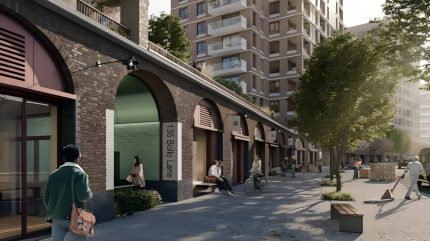
UK house builder Barratt London has announced its plans to adopt the Passivhaus standard at scale in the British capital.
This initiative is set to deliver low-energy (Lo-E) homes with up to 80% savings on heating and hot-water bills and up to 90% reductions in carbon emissions.

Discover B2B Marketing That Performs
Combine business intelligence and editorial excellence to reach engaged professionals across 36 leading media platforms.
The first of these homes will be constructed in High Barnet as part of a major regeneration scheme in partnership with Places for London.
Of the approximately 300 homes at the site, 40% will be affordable, with each one meeting Lo-E standards. A similar plan will be rolled out at Bollo Lane, Acton, with a total of 728 Lo-E homes in the pipeline for London.
Barratt’s commitment to futureproofing its developments comes in response to London’s increasing demand for sustainable and resilient housing.
All residential schemes by Barratt in the city will aim to meet or exceed Passivhaus standards, a rigorous benchmark for energy efficiency in a building, which reduces the building’s ecological footprint.

US Tariffs are shifting - will you react or anticipate?
Don’t let policy changes catch you off guard. Stay proactive with real-time data and expert analysis.
By GlobalDataThese projects are part of a larger £1.9bn ($2.54bn) collaboration intended to bring 4,000 new homes to London over the next ten years.
Barratt’s approach is based on the Passivhaus principles, which include well-defined performance and comfort criteria and strict quality assurance.
Some of the key features of these homes will include triple-glazed windows for improved insulation and noise reduction, design elements that maintain comfortable temperatures during the hotter months, and fresh-air systems that filter pollutants and reduce allergens.
For homeowners, the advantages are stated to extend beyond environmental benefits and reduced carbon footprints.
Specifically, Lo-E homes are designed to offer lower running costs and reduced dependence on energy sources with volatile pricing.
The move by Barratt to embrace Passivhaus standards has garnered commendations from city planners and the Greater London Authority.
With planning approvals pending, the developer is poised to implement this new model across all its future London-based developments.
Barratt West London managing director Craig Carson said: “Our Lo-E concept rethinks the traditional approach to high-density housing. It’s a response to the unique climate and affordability challenges we face in London. We’re proud to lead the way in delivering low-carbon, future-ready homes at scale.”



